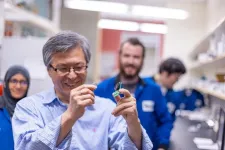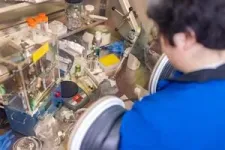(Press-News.org) As announced by the Department of Defense today, The University of Texas at Dallas will receive $30 million over three years from the DOD to develop and commercialize new battery technologies and manufacturing processes, enhance the domestic availability of critical raw materials, and train high-quality workers for jobs in an expanding battery energy storage workforce.
The award, which creates a prototype Energy Storage Systems Campus, is the largest allocation from a federal agency that the University has received to date. The Energy Storage Systems Campus will leverage and stimulate over $200 million in private capital.
Dr. Kyeongjae Cho, professor of materials science and engineering in the Erik Jonsson School of Engineering and Computer Science and co-principal investigator, will lead the project as the director of the Batteries and Energy to Advance Commercialization and National Security (BEACONS) center.
Key partners include LEAP Manufacturing, a consortium of energy storage companies; AUI (Associated Universities Inc.); the University of California, Berkeley; and the University of Chicago. The agreement provides funding from the DOD’s Manufacturing Capability Expansion and Investment Prioritization Directorate.
“This initiative is a tremendous opportunity to showcase UTD’s mission of research, service and teaching in the context of accelerating workforce development and next-generation solutions that are critical to our nation’s economy and defense readiness,” said Dr. Richard C. Benson, UT Dallas president and the Eugene McDermott Distinguished University Chair of Leadership. “The expertise of our faculty researchers, the excellence of our academic programs in engineering and science, and our demonstrated ability to leverage partnerships with industry put UTD in a unique position to lead this national effort to drive innovation in battery technology and manufacturing.”
The BEACONS center will focus on four main goals:
Optimizing existing battery systems, including integrating robotics and automation into manufacturing.
Fostering the development of new battery chemistries that reduce the use of scarce raw materials.
Identifying and tracking supply chain challenges for critical minerals, such as lithium, needed in energy storage systems.
Developing the workforce needed for energy storage system development and manufacturing.
In addition, the initiative will provide access to facilities to help entrepreneurs design, develop and demonstrate novel energy storage systems.
Response to National Priorities
The National Blueprint for Lithium Batteries 2021-2030, published in 2021 by the Federal Consortium for Advanced Batteries, outlines several goals, including maintaining and advancing U.S. battery technology leadership by strongly supporting scientific research; science, technology, engineering and math education; and workforce development.
The agreement with the DOD is an outcome of more than a year of concerted efforts by UTD leaders and LEAP Manufacturing co-directors Dr. Thomas Campbell and John Stibal to respond to the federal agency’s request for proposals.
BEACONS will include multiple UTD researchers in the Jonsson School and the School of Natural Sciences and Mathematics who work on energy storage technology, including experts in computer modeling, artificial intelligence, chemistry, prototyping and commercialization. Their work will center on developing safer, longer-lasting and more efficient next-generation battery technology, including alternatives to traditional lithium-ion cells. Lithium-ion batteries, which power everything from consumer electronics to electric vehicles, have disadvantages: They are sensitive to high temperatures and thermal runaway reactions, which can cause fires; they are difficult to recycle; and they require the expensive mining and processing of rare raw materials, such as lithium, nickel and cobalt.
UTD researchers are investigating current battery system optimization as well as next-generation batteries with alternative materials and designs, such as solid-state batteries, which use solid electrolytes instead of organic liquids or polymers, and aqueous zinc-ion batteries, which are made from raw materials that are more abundant.
New Facility
The UTD-led initiative will include construction of a research facility within a 1,200-acre area of the Richardson Innovation Quarter. The facility will include space for developing and manufacturing next-generation batteries, as well as energy storage solutions specifically tailored to defense applications. For example, defense systems operate at extremely cold or hot temperatures, encounter high shock and vibration, and may be stored for long periods then needed quickly for immediate use. Defense battery systems also are sometimes operated in environments where safety demands exceed current commercial requirements.
While the U.S. has been a leader in battery research and technology development, battery manufacturing and supplies of critical raw materials have traditionally been located outside of the country. The DOD initiative reflects efforts to bring advanced manufacturing and supply chains to the U.S., Cho said.
“We identified a unique area that satisfies the Department of Defense’s needs for battery technology,” he said. “This investment by the DOD will facilitate collaboration with our industry partners to help ensure reliable, domestic manufacture of lithium-ion cells, as well as the battery packs that support defense systems and advanced commercial systems.”
Workforce Development
UTD also will partner with community colleges in North Texas to train future employees with a range of expertise. A 2020 report from the U.S. Department of Energy’s National Renewable Energy Laboratory projects that the battery energy storage industry will need a minimum of 130,000 additional workers in the U.S. by 2030; at least 12,000 of those workers will be needed in Texas. Earlier this year, Tesla broke ground on a Texas lithium refinery to produce the battery metal for electric vehicles.
“Renewable energy is a rapidly expanding area, and Texas is leading the country in the expansion of energy storage capacity,” Cho said. “We need not only PhD-level experts but also technicians who know how to safely handle batteries.”
The initiative is a prototype for collaboration, said Dr. Joseph Pancrazio, vice president for research and innovation at UT Dallas and co-principal investigator on the project.
“UTD and our partners will ensure that laboratory research and creative ideas from small businesses translate quickly towards commercialization,” Pancrazio said. “As a national resource, the collaborative space we’re creating will streamline the path of innovation in energy storage and battery technology, from prototyping and testing to manufacturing. Coupling technological advancement with workforce development ultimately will catalyze economic growth while bolstering national security.”
UT Dallas faculty members involved in the Department of Defense-funded battery research project include:
Dr. Kyeongjae Cho, professor of materials science and engineering and co-principal investigator
Dr. Shuang Cui, assistant professor of mechanical engineering
Dr. Joseph Pancrazio, vice president for research and innovation, professor of bioengineering, and co-principal investigator
Dr. Mihaela Stefan, department head of chemistry and biochemistry, and Eugene McDermott Professor
Dr. Laisuo Su, assistant professor of materials science and engineering
Dr. Cormac Toher, assistant professor of materials science and engineering
Dr. Guoping Xiong, assistant professor of mechanical engineering
Dr. Yue Zhou, assistant professor of mechanical engineering
END
UT Dallas to lead $30 million battery initiative
2023-09-18
ELSE PRESS RELEASES FROM THIS DATE:
ACP issues updated Rapid, Living Practice Points on treating COVID-19 patients in outpatient settings
2023-09-18
Below please find a summary of a new article that will be published in the next issue of Annals of Internal Medicine. The summary is not intended to substitute for the full article as a source of information. This information is under strict embargo and by taking it into possession, media representatives are committing to the terms of the embargo not only on their own behalf, but also on behalf of the organization they represent.
----------------------------
ACP issues updated Rapid, Living Practice Points on treating COVID-19 patients in outpatient settings
Article: https://www.acpjournals.org/doi/10.7326/M23-1636
Evidence ...
Promising gene-based approaches to repair lethal lung injury in the elderly from COVID-19, pneumonia, flu, sepsis
2023-09-18
Discovery from the lab of Youyang Zhao, PhD, from Stanley Manne Children’s Research Institute at Ann & Robert H. Lurie Children’s Hospital of Chicago offers promising treatment approaches for acute respiratory distress syndrome (ARDS) in the elderly that can be caused by severe COVID-19, pneumonia, flu or sepsis. Currently there are no pharmacological or cell-based treatments for ARDS.
Dr. Zhao’s research established that a gene called FOXM1 is important in the repair of blood vessel through regeneration of endothelial cells, which line the vessels of the lung. He found that aging impairs this gene’s expression, ...
Lifesaving addiction medications are rarely started following opioid overdose emergencies
2023-09-18
Could future opioid overdoses, fatalities and other harms of opioid addiction be prevented if hospital emergency departments made better use of effective medications for opioid addiction?
A team of University of Michigan researchers thinks so.
Led by Thuy Nguyen of U-M's School of Public Health, the researchers analyzed national Medicaid claims data of patients ages 12 to 64 treated at U.S. emergency departments for opioid overdoses in 2018. They focused on ED visits for opioid overdose and the rate of initiation of FDA-approved medications for opioid addiction, including buprenorphine, methadone and extended release naltrexone.
The ...
Disparities in flu vaccine uptake persist in people with kidney disease
2023-09-18
Among adults with chronic kidney disease (CKD) enrolled in the Chronic Renal Insufficiency Cohort (CRIC), young age, Black race, and low levels of education and income were associated with lower likelihood of getting an annual flu shot.
Identifying risk factors for not receiving a flu vaccine (“non-vaccination”) in people living with kidney disease, who are at risk of flu and its complications, could inform strategies for improving vaccine uptake. In this study published in the American Journal of Kidney Diseases (AJKD), researchers led by Junichi Ishigami examined whether demographic factors, social ...
A suit of armor for cancer-fighting cells
2023-09-18
In recent years, cancer researchers have hailed the arrival of chimeric antigen receptor T cell (CAR T) therapy, which has delivered promising results, transforming the fight against various forms of cancer. The process involves modifying patients’ T-cells to target cancer cells, resulting in remarkable success rates for previously intractable forms of cancer.
Six CAR T cell therapies have secured FDA approval, and several more are in the pipeline. However, these therapies come with severe and potentially lethal side effects, namely cytokine release syndrome (CRS) and neurotoxicity. These drawbacks manifest as a range of symptoms—from high fever and vomiting to multiple ...
Dana-Farber leads adaptive, efficient multi-arm phase 2 clinical trial for glioblastoma
2023-09-18
EMBARGOED: September 18, 2023 4PM EST
CONTACT: Nicole Oliverio, nicole_oliverio@dfci.harvard.edu, 617-257-0454
Boston – An innovative phase 2 clinical trial led by Dana-Farber Cancer Institute in collaboration with 10 major brain tumor centers around the country and designed to find new potential treatments for glioblastoma has reported initial results in the Journal of Clinical Oncology. While none of the three therapeutics tested so far improved overall survival of patients, this adaptive platform trial, the first of its kind in neuro-oncology, has the potential to rapidly and efficiently identify therapies that ...
New research highlights importance of equity in education
2023-09-18
A new study looks at the impact of learning environments on the academic success of racialized students. Compared to their peers, these students feel they have less control in their academic environment, less confidence and self-efficacy in their academic abilities, and weaker connections to other students and professors.
The University of Ottawa study underscores that higher education institutions must recognize and address the specific needs of their racialized student communities and create inclusive learning environments that better meet these needs. Failing to do so could affect the overall psychological well-being and academic performance ...
Cell therapy can reduce risk of death from COVID-19 by 60%, study shows
2023-09-18
The use of cell therapy to treat COVID-19 patients can reduce the risk of death from the disease by 60%, according to a systematic review and meta-analysis conducted by researchers at the University of São Paulo (USP) in Brazil, in partnership with colleagues in Germany and the United States.
Their findings are reported in an article published in the journal Frontiers in Immunology.
The review covers 195 clinical trials of advanced cell therapies targeting COVID-19 that were conducted in 30 countries between January 2020 and December 2021, as well as 26 trials with outcomes published by July 2022.
Cell therapy has come into increasingly frequent use in recent years ...
The pace of climate-driven extinction is accelerating, a UArizona-led study shows
2023-09-18
Climate change is causing extinctions at an increasing rate, a new study by the University of Arizona researchers shows. They surveyed populations of the Yarrow's spiny lizard in 18 mountain ranges in southeastern Arizona and analyzed the rate of climate-related extinction over time.
"The magnitude of extinction we found over the past seven years was similar to that seen in other studies that spanned almost 70 years," said John J. Wiens, a professor in the Department of Ecology and Evolutionary Biology at UArizona, ...
Nuclear medicine treatment cures lethal form of ovarian cancer in preclinical setting
2023-09-18
Reston, VA—A new 225Ac-DOTA-based pre-targeted radioimmunotherapy (PRIT) system has been shown to cure a highly lethal form of advanced intraperitoneal ovarian cancer in a preclinical setting with minimal side effects. Targeting the HER2 protein, which is commonly expressed in ovarian cancer, the therapy (anti-HER2 225Ac-PRIT) is a potential treatment for the otherwise incurable disease. This research was published in the September issue of The Journal of Nuclear Medicine.
Epithelial ovarian cancer is the most lethal ovarian cancer and frequently presents as advanced-stage disease, ...






